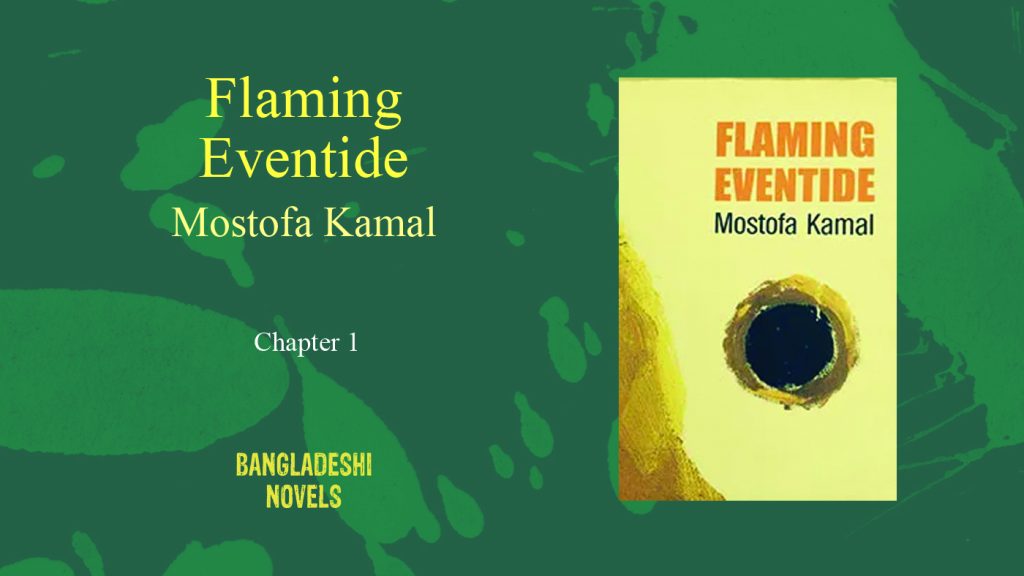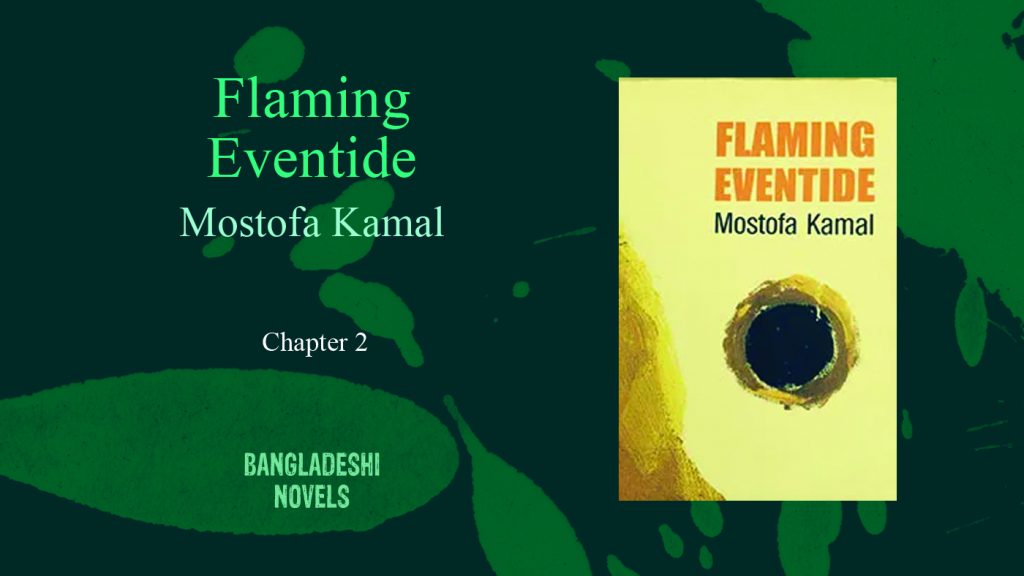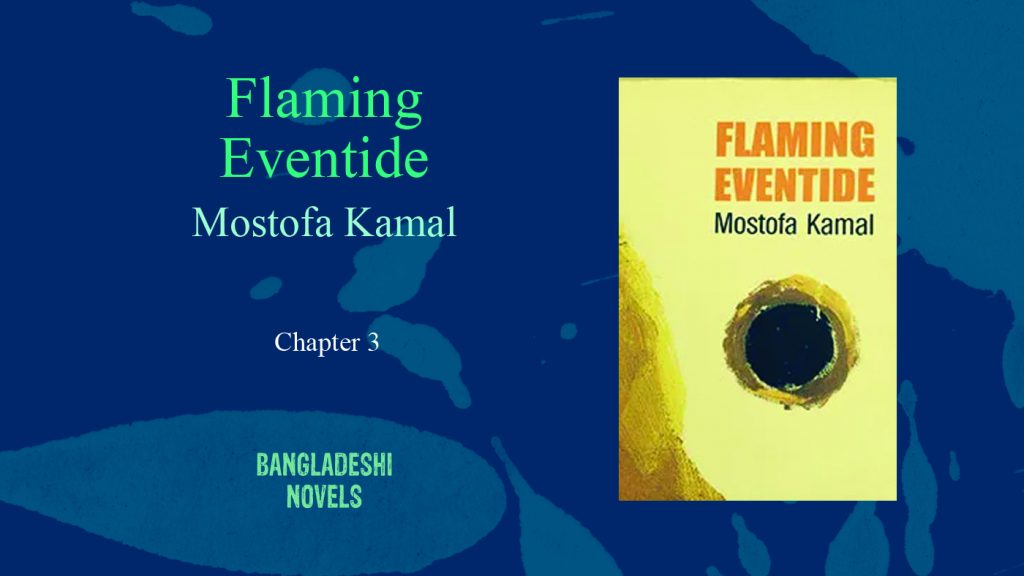Chapter 3
Finally Dad’s date of departure was fixed. He was scheduled to leave Dhaka on 7th February. I had a great desire to see off dad in the airport. But that was impossible to do when I was back in the village. Mom looked pretty sick lately and her temper had taken a leap as well. I avoided any contact with her. Who wanted to be barked at for nothing? I wondered if any airplane flew over these villages. I had serious doubt. Regardless, I didn’t lose hope completely. Every morning I routinely asked dadu what date it was. Just in case dad’s plane flew over us. I wouldn’t have missed it for anything.
The harvesting in winter was one of my favourite events. The villages turned into a festive mode. The large courtyard of my grandparent’s house would convert into an operation center. First, the grains had to be separated from the paddy. Several cows were tied by ropes around a central pole with a bearing that allowed the animals to walk around in a circle. A group of farm hands carried the harvested paddy from the fields to the yard in bundles. Another group banged these bundles on a flat wooden surface to separate the loose grains from the sheaf. Next the bundles were loosened and the sheaf of paddy spread in layers on the path of the cows who were driven to walk around and around. The continuous movement of their hooves forced the grains to detach and pile up. The grains were collected on regular interval and new batches were placed. This was a familiar view in the villages of Bangladesh. I loved it so much that I could probably watch from dawn to dusk. The steady movement of the workers, the rhythmic shuffling noise of the cow huffs on the paddy, the brisk movement of the women preparing large pots to boil the rice and the thick sound of the wooden rice huller thudding on regular interval to remove the husk and bran from the grains – as a whole it was a memorable experience for the eyes, ears and mind. I always had this desire to team up with the farm hands and harvest the paddy from the fields with a crescent shaped knife, bundle them up and carry on my shoulder to the house. The hardship, the sweats, the dog tired labourers – it all seemed like part of an adventure. I begged my mom numerous times to let me go with Alek but in vain.
Unfortunately, this time we came too late. The harvesting had already completed. This was a great disappointment.
My grandparent’s house had two separate large units with thatched roof. The main larger unit was located in the lower half of the rectangular courtyard on a six feet high mud base and faced south for good air ventilation. This unit had a bedroom where dadu and dadi slept and a cold room where rice, molasses, relishes were stored. The other unit was occupied by jhima. It was considerably smaller, had a three feet high base and faced the larger unit. Strategically put couple of mud walls created some privacy for the women behind the main house where the kitchen and a covered eating space were located. A separate back entrance allowed maid servants to go to the pond to fetch water or do other errands in the garden.
We – mom, Rushi and I – used to sleep in the same room with jhima, on a second bed. Jhima didn’t do much of the household work. She was not in good terms with dadi and even insignificant things set up large scale showdowns. Dadi was not known to raise her voice but she tried her best to hold her ground against the thunderous voice of jhima. Luckily things never spilled out of control. Jhima was severely short sighted and slightly hard of hearing. She had to feel her way down the stairs to the courtyard from her terrace. I heard she had cataract. Dad planned to get her operated but didn’t have time before he left. Jhima was notorious for bossing around the maids, servants and farm hands. She sat on a handcrafted mat on her terrace and called out at everything and everybody as she felt necessary. “Hey Moti, give that cow a nudge. Don’t dose off.” “Alek! Work faster. We don’t pay you for nothing.”
Nobody paid much attention to her though. She was equally liked and disliked. However, very few had the courage to take a stand against her. She had a nightmare of a tongue, especially when she got mad. She had an infinite collection of curses and marvelled in delivering them, particularly ensuring that none from immediate ancestors of the target were spared. No wonder everybody left her alone. I was the jewel of her eyes. Being the only male child in my dad’s side of the family I enjoyed relatively more attention than the other kids. This was customary in villages. A male child was considered to be the one carrying the family name. Chachu had no son. My birth had brought much celebration in this courtyard, I heard. A widow and childless, jhima had embraced me with all her heart. Since birth I had always slept in her room, as a baby rested on her lap hours at a time, during sicknesses ate soup of the chickens she raised and most of all was indulged beyond belief. No matter what mischief I did, as long as I made it to her lap there was not a soul who could give me grief. Any complains were protested so vehemently that everybody just gave up. This was true about mom too, thankfully. This made my visits to grandparent’s house particularly relaxing.
Life was good but not what it could be if Rani apa was there. I really started to miss her. I was hoping to make the trip to my maternal grandparents’ (nana) house soon where I could pack up with Rani apa, but it just kept on delaying, for reasons that I could only blame mom for. She had been looking fairly strange lately, complaining about feeling nauseous all the time and having no appetite. It was quite evident that something mysterious was happening to her which was being kept a secret from me. Dying in curiosity finally I asked jhima, who laid it out before me with a mouth full of smile. I was going to have a new tiny brother or sister. I didn’t fully understand the concept. I had no memory of the time when Rushi was born. What having a new sibling had to do with mom not feeling well was out of my grasp but I was quite disappointed because it was holding us back from going to nana’s house.
One afternoon the village doctor paid us a visit. He pressed here and there on mom’s belly and then declared smilingly what everybody had guessed already. She was going to have another baby. He found it surprising that it took this long to catch her pregnancy. To everybody’s dismay mom looked heartbroken. She would be limited in her movements and might not be able to travel to West Pakistan to dad. She wept silently for a few days. I didn’t dare to ask her anything, neither did Rushi. She kept on asking me. I said something good to comfort her. I prayed heavily for a little brother. One crying machine like Rushi was just enough for our household. Any more of that and I would have to look for foster home.
Dad’s flight was on 7th February. Everybody talked about it all through the day. I anchored in the outfields with my eyes fixed on the sky, excited and restless. What if his airplane flew over us? Perhaps I could get a glimpse of it. But all my waiting went in vain. At dusk, when everybody failed, mom herself took the painful trip to the outfields and pulled me inside. “Which way did dad’s plane flew mom?” I asked teary-eyed.
Mom smiled patiently. “Planes don’t fly over here, son. Don’t worry. We’ll soon be with him.”
I sighed. I wanted to go live with dad but at the same time did not want to leave my grandparent’s house. And there was nana’s house and Rani apa. It was a difficult choice to make.
Before going to West Pakistan my dad was promoted to Captain. The promotion became possible solely upon the good recommendation of his C.O. Colonel Jahangir who liked him very much. Not only he wrote a strong letter of recommendation, he also called dad into his office and conferred, “Once your training is complete, you’ll be posted to Quetta Cantonment. Feel free to contact General Gul if you have any problem. He is Panjabi but very open minded. We are in very good terms. Don’t hesitate to mention me.”
Dad, along with a few others, flew for Abotabad, West Pakistan. This place was near Pindi and belonged to North Frontier Province. Dad was to receive training in the Medical Training Center located there. However, after reaching their destination they were informed that the planned training had been cancelled and they were to report to their respective work place. Dad was posted to Quetta. It was the capital of the province Baluchistan. Dad asked a day off to check around, but was denied. As a result he and few others had to start for Quetta almost immediately. Their train was to go to Lahore first and then to Quetta – one and a half day journey. They would travel from one part of the country to the other. There was no planned break in Lahore.
He met quite a few people on the train. All West Pakistani, who spoke Urdu. Dad could speak a little Urdu. He somehow managed to carry on conversations. His fare complexion and broken Urdu had many believe that he was a Pathan. This allowed some to open up their minds. It became quite clear that most were against handing over the government to Sheikh Mujibur Rahman, the undisputed leader of East Pakistan. Even though Bhutto was defeated in the election they felt he should form the government of united Pakistan. Dad quietly listened to them. There was no sense in getting into unnecessary trouble. It was clear to him that most of these people had no understanding of the concept of democracy.
Later he met an adjutant who had a different opinion. He had trained under Ziaur Rahman, a future leader of Bangladesh, in the Army center located in Kakul. This was the first time in the trip that dad met a West Pakistani who he found rational. Adjutant clearly stated, “See, I don’t care about East or West. If we have set up a system where we are to elect our head of government by means of majority of votes received, then I want to stick to that. Bhutto shouldn’t be coming up with all these useless excuses after he has lost in the election. If things don’t get settled soon enough I fear we might get into some serious commotion. Can’t say about others but I have no desire to go in a war against the Bengalis. Not only they are my compatriots, most of us also share the same religion.”
Dad did not hide his true identity to him. The Adjutant must have had grown a soft corner for East Pakistan as a direct consequence of his training under Ziaur Rahman. Dad felt very homely in the company of this friendly and sensible person.








